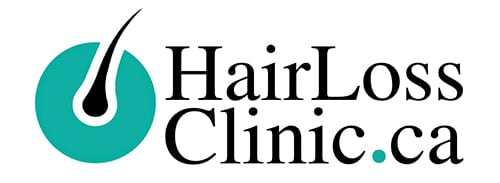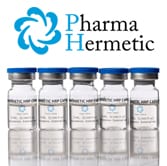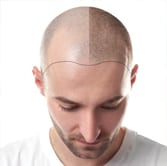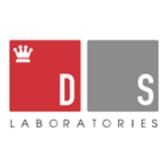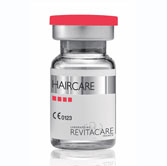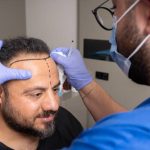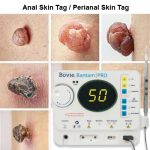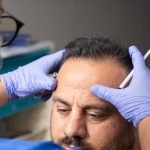
ECZEMA | CAUSE & TREATMENT | HAIR LOSS CLINIC TORONTO
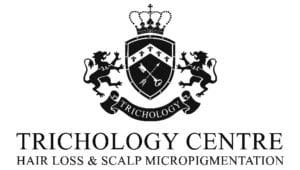
FREE ONLINE HAIR LOSS ASSESSMENT FORM
Are you experiencing any hair loss or scalp issues? Get a Certified Trichologist to assess and help treat your condition in Toronto and Greater Toronto Area. Please complete our online Trichology Assessment Form to get started now.
What is Eczema?
Eczema an autoimmune skin condition in which patches of skin becomes inflamed, red, itchy, cracked, and rough. Most common type is Atopic dermatitis, a chronic disease and tends to flare up periodically.
Atopic refers to a collection of diseases involving the immune system, including atopic dermatitis, hay fever, and asthma. People, particularly children with eczema often has a greater risk of developing asthma and hay fever as they all involve the immune system.
Not every child who has eczema will develop both hay fever and asthma. Some kids develop neither. The likelihood of developing these conditions increases when a child has a close blood relative who has hay fever or asthma, or if their eczema flares frequently or continuously.
Eczema affect 31.6 percent of people in the United States.
Eczema almost always starts in infancy or before age 5. It is common in babies and children. Often, they develop eczema on their face, but can appear anywhere on the body. Usually the condition goes away as the child grows older, though some children will continue to experience eczema into adulthood.
What Causes Eczema?
Common causes of eczema include an allergic reaction to something touching the skin, such as poison ivy, or contact with chemicals that damage the outer skin, such as soaps and solutions that dry or irritate the skin. Also, allergens like dust mites, pets, pollen, mold can trigger eczema. Foods like eggs, nuts and seeds, soy products, and wheat can also be triggers if there is an allergy to them.
7 Types of Eczema
Eczema is sometimes called atopic dermatitis, which is the most common form. “Atopic” refers to an allergy. People with eczema often have allergies or asthma along with itchy, red skin.
Eczema comes in a few other forms. Each eczema type has its own set of symptoms and triggers.
| Atopic Dermatitis | Most common type of Eczema. It is a condition where patches of skin become inflamed, itchy, red, cracked, and rough. Blisters may sometimes occur. ... “Atopic” refers to a collection of diseases involving the immune system, including atopic dermatitis, asthma, and hay fever. |
| Contact Dermatitis | It is a red, itchy rash caused by direct contact with a substance or an allergic reaction to it. |
| Dyshidrotic Eczema | An acute recurrent eruption of multiple tiny, intensely itchy water blisters on the palms, sides of fingers and soles of the feet. |
| Lichen Simplex Chronicus | Localized, chronic thick itchy plaques that commonly occur on the sides or back of the neck, wrists, ankles, lower legs and inner area of the thighs. |
| Nummular Eczema | Multiple, round plaques of eczema that are usually associated with dry skin and occur on the outer surfaces of the hands, arms and legs. |
| Seborrheic Eczema | Yellowish-brown, greasy, scaly patches on the scalp, eyebrows, nose and chest. |
| Stasis Dermatitis | A chronic eczema on the inner area of the lower legs and associated with varicose veins. |
What’s the Difference Between Eczema, Psoriasis, and Seborrheic Dermatitis?
The 3 conditions often get confused with each other, but they are uniquely different from each other.
| Skin Condition | Symptoms | Onset of condition and Affected Areas | Triggers | Causes and Other factors |
|---|---|---|---|---|
| Eczema | Eczema is the name for a group of conditions that cause the skin to become red, itchy and inflamed. Symptoms: Dry, sensitive skin. Red, inflamed skin. Very bad itching. Dark colored patches of skin. Rough, leathery or scaly patches of skin. Oozing or crusting. Areas of swelling. | Onset: Condition usually starts as a baby. Affected Areas: Appear on the feet, hands and nape of neck. If condition appears on the elbows and knees, it is appearing on the back of the elbows and front of the knees. | Allergens like dust mites, pets, pollen, mold. Foods like eggs, nuts and seeds, soy products, and wheat. | Causes: genes dry skin an immune system problem triggers in the environment Most common type is known as Atopic Dermatitis. It is an Atopic disease involving immune system, including atopic dermatitis, asthma, and hay fever. Commonly found in families with a history of other allergies or asthma. |
| Psoriasis | Skin disorder that causes skin to multiply 10 times faster than normal. Symptoms: Red, raised, inflamed patches of skin. whitish-silver scales or plaques on the red patches. dry skin that may crack and bleed. soreness around patches. itching and burning sensations around patches. thick, pitted nails. painful, swollen joints. Affects nails more seriously causing pitting, thickening, or ridges. | Onset: Condition usually starts as a baby. Affected Areas: Appear on the feet, hands and nape of neck. If condition appears on the elbows and knees, it is appearing on the back of the elbows and front of the knees. | Stress, skin injury, medications, infection | Causes: It is an autoimmune disease with the immune system mistakenly attacking healthy skin cells. Usually associated with other health issues like diabetes, depression, heart disease, and arthritis. Chronic skin disease. It can cause the skin to grow so quickly that they accumulate on the surface of the skin as white scales. |
| Seborrheic Dermatitis | Chronic inflammation of the skin. Symptoms: Skin flakes (dandruff) on your scalp, hair, eyebrows, beard or mustache. Patches of greasy skin covered with flaky white or yellow scales or crust on the scalp, face, sides of the nose, eyebrows, ears, eyelids, chest, armpits, groin area or under the breasts. Red skin. | Onset: Condition usually starts as a baby. Affected Areas: Appear on the feet, hands and nape of neck. If condition appears on the elbows and knees, it is appearing on the back of the elbows and front of the knees. | Stress, hormone changes, chemicals, illness, solvents, soaps, harsh detergents, dry weather, microorganisms on the skin. | Causes: Exact cause unknown. Genes and hormones play a role. Not a result of an allergy. Made more likely by factors such as increased production of sebum (an oily substance) in the skin, fungi that affect the skin like yeast, and a weakened immune system. |
What Treatment is Available for Eczema?
There is no cure for eczema. Certain treatments are available to help with the condition and help manage the inflammation and itchiness.
Prescription topical medications include corticosteroids (steroids), PDE4 inhibitors, topical calcineurin inhibitors (TCIs) and skin barrier creams. Available through your doctor, these medications are applied to the affected area of the skin to help ease redness, rash, dryness and itching.
Foods to Avoid that May Trigger Eczema
Some common foods that may trigger an eczema flare-up and could be removed from a diet include:
- citrus fruits.
- dairy.
- eggs.
- gluten or wheat.
- soy.
- spices, such as vanilla, cloves, and cinnamon.
- tomatoes.
- some types of nuts.

FIND A TRICHOLOGIST IN TORONTO GTA
With the numerous available treatments for Eczema our Trichologist can recommend the best treatment that can help with your Eczema. At Trichology Centre, we have helped patients with Eczema, advising them the best treatments available and helping them regain their confidence and self-esteem. Early assessment and treatment from the onset of Eczema is important and can help prevent the condition to worsen.
We have two clinics in the Toronto GTA,
TRICHOLOGY CENTRE | hairlossclinic.ca | hairtattoo.ca | laserhairtherapy.ca
225 Wellesley St E, Toronto
9140 Leslie St, Richmond Hill.
Please give us a call at 647-492-9093
ADDRESS
Toronto, 225 Wellesley St East #5
Richmond Hill, 9140 Leslie St #301
PHONE
(647) 492-9093
hairlossclinic.ca@gmail.com
WORKING HOURS
Mon-Sat 9:00 am - 8:00 pm
Sunday CLOSED
Comments are closed.
